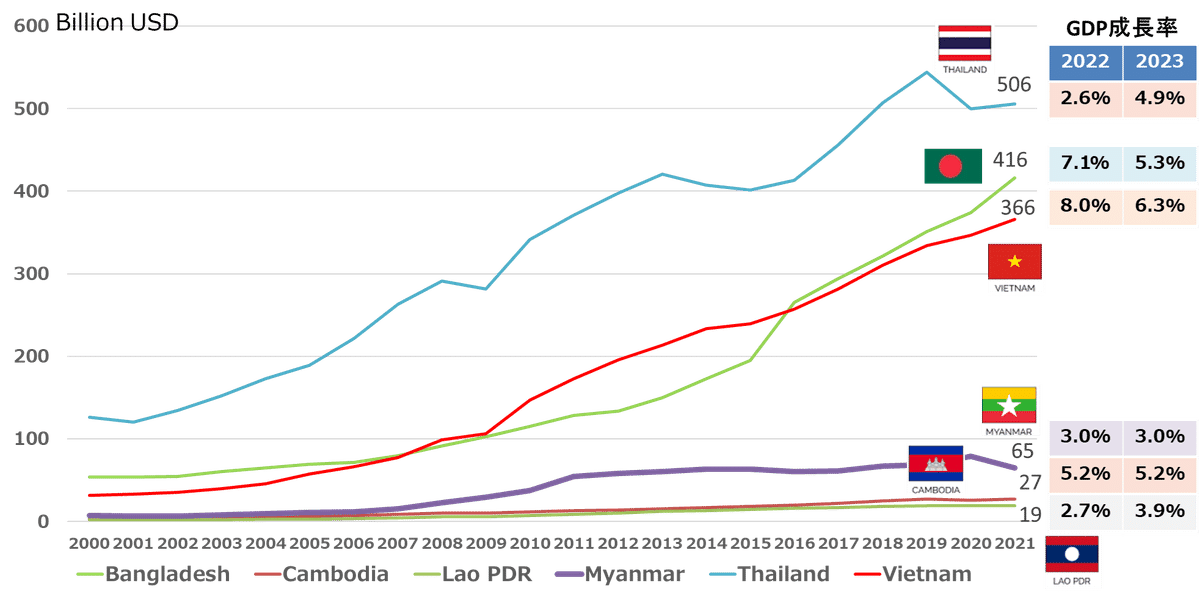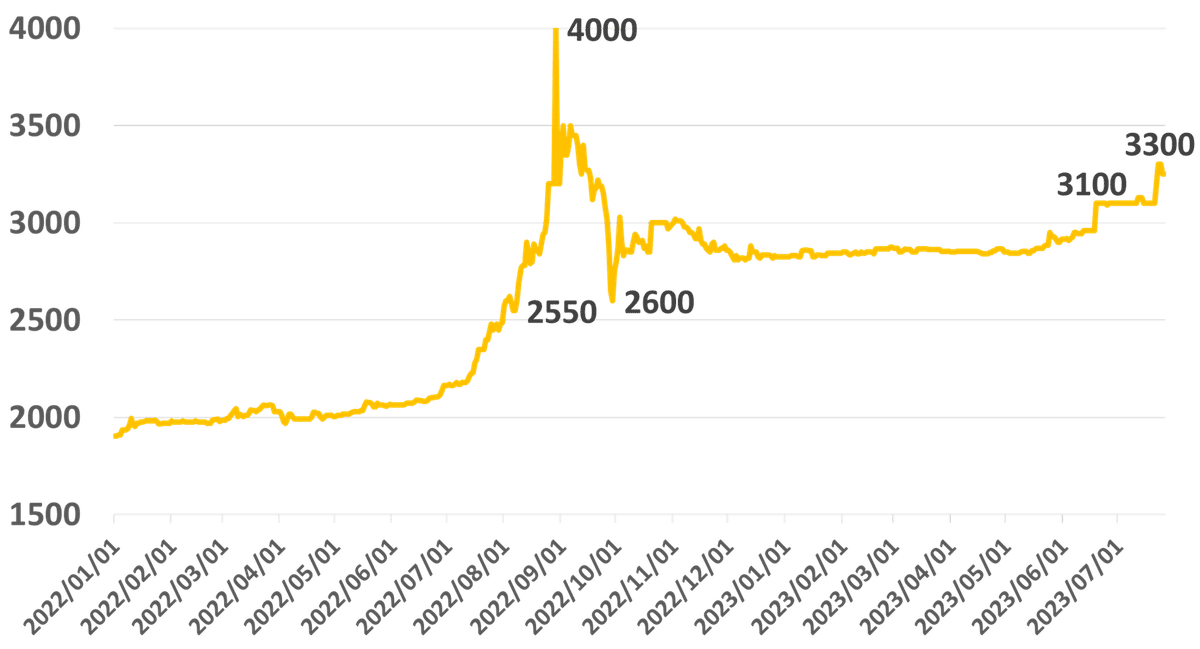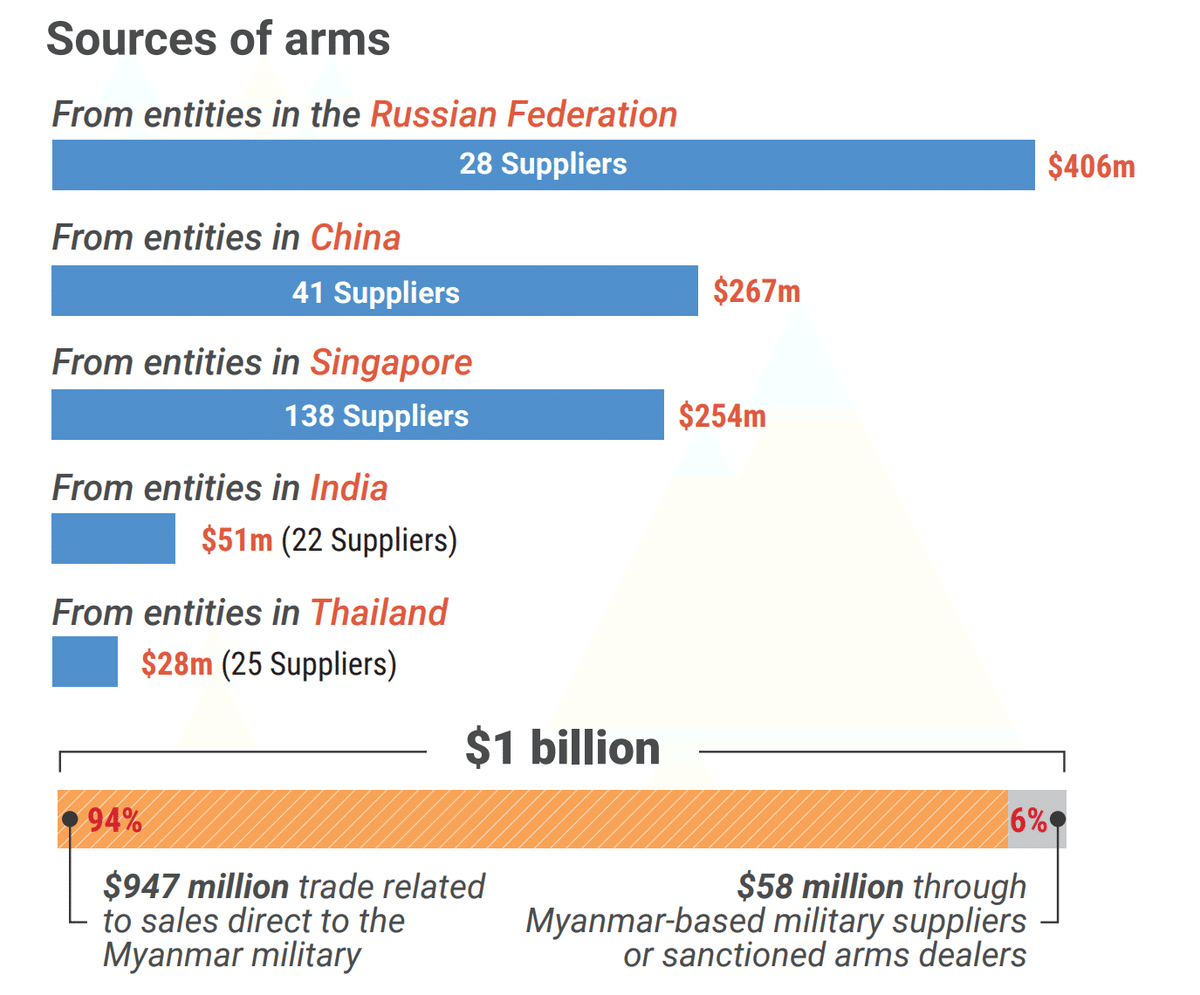
㉝ミャンマーの経済状況(経済制裁関連)
今回は、珍しくミャンマーの最近の経済情勢を解説します。
※8月9日に「シンガポールの銀行の動向」を追記
ミャンマー経済の基礎(世界銀行のレポート)
まず、はじめにミャンマーのような途上国には、往々にしてデータがありません。
そのため、データ取得、データ作成、データ分析をできる世界銀行のレポートは貴重です。
半年に1度発行されているミャンマーのレポートがありますので、ミャンマー経済の詳細を知りたい方はご参照下さい。
Myanmar Economic Monitor Reports (worldbank.org)
ミャンマーの経済状況(周辺国との比較)
ミャンマーとミャンマーを囲む周辺国の経済の比較です。
●ミャンマーは5,700万人(カンボジア:1,550万人、ラオス:734万人)と人口が多いため、カンボジア、ラオスと比較するとGDPは大きくなります。
●ミャンマーのGDP成長率は、22・23年とそれぞれ3.0%の見込みで、今後、周辺諸国と比較して成長率の差が開いていくことが予想されます。

ミャンマーの経済規模(日本の県との比較)
ミャンマーを日本の県に例えると、長野県と似た規模のGDPレベルです。
●ミャンマーは長野県、カンボジアは山梨県、ラオスは高知県のGDPに近い。
●都道府県順のGDP規模で長野県は18位、山梨県は42位、高知県は46位。タイ、バングラデシュ、ベトナムは東京と大阪の間に位置するGDP規模。

ミャンマーとその周辺国の1人あたりGDP推移
1人あたりGDPは、ミャンマーがASEAN10ケ国中で最低です。
●ミャンマーの1人あたりGDP(1,210ドル)は、ラオス(2,536ドル)、バングラデシュ(2,458ドル)の2分の1であり、カンボジアより低い。
●2021年は2021年比でマイナス18%の激しい落ち込みを記録し、他国との差がより開いている。

ドル・チャットの実勢レート
これらの状況を踏まえた上で、2021年1月以降のドル・チャットの実勢レートは以下です。

クーデター以前の2021年1月1日は1ドル=1.900チャットでしたが、2022年8月末に4,000チャットになり、そこから23年5月初旬までは1ドル2,800チャットで安定していました。8カ月間もレートが安定していたのは、奇跡に近いと思います。
しかし、23年5月中旬あたりに、じわじわとチャット安が進み、6月下旬には跳ね上がり、7月末時点では1ドル=3,300になっています。
さて、何が起きたのでしょうか?!
米国による経済制裁(2銀行への制裁)
23年6月21日に米財務省が、ミャンマー外国貿易銀行(MFTB)とミャンマー投資商業銀行(MICB)の2銀行を「特別指定国民(SDN)」に指定する金融制裁は発動しました。
これにより、MFTB、MICBにミャンマー政府が預金していた米ドルが凍結されてしまったのです、、、
2銀行の位置づけ

2銀行の位置づけは、Two Big to Myanmar Governmentです。
上の図は2005年に出版された書籍の図です。
国営銀行(State Banks)の下に、MEB(経済銀行)、MFTB(外国貿易銀行)、MICB(投資商業銀行)の3つがあることがわかります。
この3行のうち、主にドル決済を担っている2行が制裁対象になってしまいました、、、
ミャンマー人の友人は、Netflixの決済が止められたと怒っていました。
ミャンマー人が、ドルを使用するアメリカ製品・サービスの購入は、不可能になると思われます($・・)/~~~
EUの制裁の効果
最近の報道(7月6日)では、EUの制裁の効果が上がっているというものがあります。
Myanmar regime opens bogus bank accounts to bypass Western sanctions on MOGE (myanmar-now.org)
EUが2022年2月1日にミャンマー石油公社(MOGE)に対して金融制裁を科して以降、MOGEが各プロジェクトで得た収益5億430万米ドルが海外の口座で凍結されているようです(内訳は、シュエガス田→中国へのガス売却3億2,680万ドル、ヤダナガス田→タイへのガス売却6,900米ドル、中国のガスパイプライン使用料1億890万ドル)。
ここで、あれ?!
と思った人は、国際金融に関してのセンスがある人です!(^^)!
なぜ、EUの制裁で、米ドルが止まる(海外の銀行口座の米ドルが凍結される)のでしょうか?
米国の制裁によって、米ドルが止まるのなら理解できますが、、、
EUの制裁の隠れた効果(hidden effect)
経済制裁を理解したい人に、最もおすすめなのが、以下の本です。
(桐島は、他に「経済制裁の研究-経済制裁の政治経済学的位置づけ」、「経済制裁-日本はそれに耐えられるか」という書籍しか読んでいませんが、、、)

最近のアメリカの経済制裁をわかりやすく解説しています。
そこに、EUの制裁で、米ドルが止まる理由が書かれていました。
答えは、ディリスキング(De-Risking)でした。
ディリスキング(De-Risking)
制裁の負の効果としてディリスキングの問題がある。
ディリスキングとは、リスクを避ける、リスク回避という意味だ。銀行など金融機関は制裁対象が依頼してきたドル建ての送金業務などを行っただけで、自分たちが制裁対象となり、莫大な制裁金を支払うことになる。最悪の場合は世界の金融センターでの銀行業務の免許が取り消されるという脅しがついている。
(中略)
ある邦銀関係者は「米国での銀行業務の免許を停止される恐れがあるとすれば、金融機関の心理は、少しでも懸念のある取引はしないということだ」と私に語った。
銀行は「危ない相手」だけでなく「危なそうな相手」との取引にも慎重になる。危なそうな相手とは、米財務省や国連のリストに載っている制裁対象者だけでなく、そうした組織と何らかの取引や関係のある人物である。そこまで広げないと、「テロなど違法行為の支援者との取引」を行ったとして罰せされる懸念があるのだ。
少しでもミャンマーという国がリスクだと認識すれば、EUがミャンマーに制裁したことを踏まえて、民間銀行はミャンマー企業やミャンマー人の口座を自主的に閉鎖しています。
米ドルが凍結されているのは、主にシンガポールと言われています。
シンガポールは、アメリカ、EUとのビジネスが多いため、ミャンマーに構っていて、金融業務が出来なくなることを恐れているわけです。
(「ミャンマーの経済規模、長野県レベルですので、まあ、それは、アメリカとEUを選びますよね♪」)
更に、米国の恐ろしさは、その罰金の大きさである。
たとえば、三菱東京UFJ銀行の例を見てみよう。2012年12月の857万ドルの制裁金支払いの場合では、財務省外国資産管理室(OFAC)によると、2006年から07年の1年間に米国の制裁対象国であるミャンマーやスーダン、イラン、キューバの国籍を持つ個人や法人などに対し、ドル建てで少なくとも97件、計約600万ドルを、ニューヨーク支店などを通じて不正送金していたという。しかし、600万ドルの不正送金に対して、その額をはるかに超える制裁金857万ドルとは実に厳しい。
(中略)
「罰金の額は懲罰として十分痛みを感じるものの、その銀行の規模からしてつぶれない程度に設定されている。1年分の儲けと言われてもいる。大きな額の支払いを命じられるということは、米政府がその銀行がそれだけ儲かっていると判断している証明だ。」これは長く国際金融界にいた人物の見立てだ。金融制裁に詳しい元米財務省当局者は、大企業に対して巨額の罰金支払いを命じることでメディアに大きく取り上げてもらい、他企業への抑止力とする狙いもあると述べている。
このような額の罰金に耐えられないため、シンガポールの銀行は、ミャンマー企業・人との取引を辞めたのです。
FATF(ブラックリスト)入り
少し専門的な知識になりますが、ミャンマーは、2022年10月21日に、先進国の金融政策当局(日本でいると財務省が出席)でつくる金融活動作業部会(FATF:ファトフ)により、ブラックリスト(行動要請対象の高リスク国)に追加されました。
これは、北朝鮮、イランに続き3ケ国目です。
金融政策で世界で最も権威がある国際機関のFATFが、ミャンマーを「危険」と宣言しているため、(シンガポールの)銀行は、ミャンマーの企業への金融サービスの提供を辞めようとしているわけです。
シンガポール(銀行)の危機感
火種となったのは、以下のグラフです。

これは、23年5月17日に国連が公表したレポートです。https://www.ohchr.org/sites/default/files/documents/countries/myanmar/infographic-sr-myanmar-2023-05-17.pdf
その後、41のみならず、91のシンガポールに拠点を置く組織(Suppliers)がミャンマーとの武器の取引に関係があることが判明しました。
故に、シンガポールの民間銀行は、自主的にミャンマーとの取引を停止したのです。知らず知らずに、武器を扱う組織に金融サービスを提供している可能性があるためです。
まとめると、以下の流れです。
国連のレポート(5月17日)→欧米制裁の雰囲気を感じる→民間銀行は自主的に取引停止=ミャンマー政府・企業・人のシンガポールの口座の閉鎖→ミャンマーはシンガポールの銀行の資金にアクセスできなくなる→政府チャット安の進行
世界は、蜜に繋がっていることがわかります。
少し長くなりましたが、23年7月末時点のミャンマーを取り巻く状況です。
シンガポールの銀行の動向(8月9日追記)
8月9日に日経Asiaに以下の記事が出ました。私が上記で述べた動きがうまくまとまっています。
ポイントは以下の通りです。
●UOB@シンガポールは、9月1日以降、ミャンマーの地場銀行と他国の銀行間の送金取引を中継する業務を停止(=コルレス銀行機能を停止)
●他行が関連するUOBのビザやマスターカードの取引も停止
※同じ銀行内口座の資金移動は可能(=Book Transferは可能)
●OCBC、DBSも同様の対策を取ろうと準備中。
●背景には、米政府のシンガポールへの働きかけがある。
●(ミャンマー企業はシンガポールの銀行からタイの銀行へ切替えるはずなので)今後は、タイの銀行の存在感が高まる。
NIKKEI Aisa (Wednesday, 9 August 2023)
Key Singapore bank UOB moves to cut off Myanmar
GWEN ROBINSON, Nikkei Asia editor-at-large August 9, 2023 10:43 JST
BANGKOK -- A key Singaporean bank is cutting off counterparts in Myanmar, ending correspondent bank relationships in a move that could significantly restrict the military regime's access to the global financial system.
In a confidential note sent to Myanmar banks last week, United Overseas Bank(UOB) said it would restrict all incoming and outgoing payments to and from Myanmar accounts, allowing funds to be moved only between accounts held with the bank. It also announced tough new curbs on Visa card and Mastercard transactions for Myanmar individuals and banks, which would restrict their dealings only to accounts within UOB. In addition, UOB said it would close Myanmar banks' "nostro" accounts at its Hong Kong branch -- foreign currency accounts banks hold at overseas counterparts to facilitate trade.
UOB is known as the offshore bank of choice for Myanmar's generals, big corporations and wealthy individuals -- as well as many international organizations and foreign investors, particularly those who run Myanmar operations from Singapore. Some banking analysts see the clampdown(取締り), unprecedented for a Singaporean financial institution, as a response to U.S. pressure on Singapore to curb offshore banking and financial services for Myanmar's military regime. It also reflects the growing costs of doing business with the regime and concerns about reputational risks. The military seized power from a democratically elected government in February 2021 and continues to wage a brutal campaign against resistance forces.
The new UOB framework is to kick in on Sept. 1, applying to transactions in all main currencies, including the U.S. dollar, euro and Singapore dollar. UOB declined to comment on the planned framework. "We do not comment on customer relationships," a spokesperson told Nikkei Asia. "However, we continue to serve our customers and process transactions," he said, without elaborating.
Since UOB's notice, some of Myanmar's largest commercial banks have begun warning customers. AYA Bank told account holders in a memo on Friday: "We have received an important update from UOB, Singapore, which is one of our main intermediary banks. Starting from 1st Sep. 2023, UOB will only accept incoming payments from and outgoing payments to accounts that are with UOB. ... AYA Bank will continue to work closely together with our other partnered banks to ensure uninterrupted funds flow."
A Yangon-based foreign banker familiar with UOB's decision said it was largely in response to American pressure, combined with Western sanctions and growing international demands for increased oversight of Myanmar-related transactions.
The move follows a series of visits to the city-state in recent months by high-level U.S. representatives. These include State Department Counselor Derek Chollet and senior sanctions coordination officials, who met with the Monetary Authority of Singapore and key Singaporean banks in April. In a visit in October 2021, Chollet tweeted about discussing with the MAS "ways to limit the Burmese military regime's access to overseas financial assets."
Singapore's role as an offshore banking hub for Myanmar's military and government entities is also understood to have been raised during Prime Minister Lee Hsien Loong's visit to Washington in May 2022.
UOB established a representative office in Yangon in 1994 and was among the first wave of foreign banks to gain a wholesale banking license in 2014, as the country underwent ill-fated democratic reforms. Singapore's OCBC also gained a license that year, among a total of nine foreign banks. UOB opened its first Yangon branch in 2015.
UOB over the years built up what veteran Yangon bankers describe as the "lion's share" of banking business with Myanmar companies, military entities and wealthy individuals, while becoming the main intermediary for many of Myanmar's biggest banks -- among them the state-owned Myanma Foreign Trade Bank (MFTB) and Myanma Investment and Commercial Bank (MICB). Both MFTB and MICB were targeted by U.S. sanctions in May
for their military ties.
A Yangon-based foreign financial expert said the impact of UOB's latest decision would be "huge."
"It is not clear as to the percentage that Myanmar's banking and business sector relies on UOB, but it is quite high," he said. While U.S. bank JPMorgan is understood to have ceased all Myanmar-related transactions earlier this year, both directly and indirectly, the expert said UOB has continued to process foreign currency transactions.
"While UOB's decision is in itself a big challenge, it is also very symbolic and means that other [offshore] banks might follow suit," he said.
JP Morgan declined to clarify its withdrawal from clearing Myanmar transactions.
A Myanmar Airways International jet over Bangkok: UOB warned in July that the regime-linked airline's accounts would be closed by mid-August.
Singapore generally has been seen as a key offshore banking hub for Myanmar. The city-state was named in a May report by Tom Andrews, the United Nations Special Rapporteur on Myanmar, that linked Singapore to $254 million worth of trade in arms and related materials to the Myanmar military. It said Singaporean banks had been "used extensively" by arms dealers to move payments for "hundreds of millions of dollars of arms transfers."
In response, the Monetary Authority of Singapore said on May 19 that Singaporean banks would not facilitate the arms trade, in line with a government ban, and that the institutions would "take further action if necessary."
UOB itself had shown growing discomfort over its deep involvement with Myanmar. In July it warned Myanmar Airways International, a commercial enterprise closely associated with the regime, that it would close all the airline's accounts by mid-August.
One Bangkok-based banking analyst sees another factor in UOB's screw-tightening. Last October, the Financial Action Task Force, a Paris-based international monitoring organization, added Myanmar to its blacklist of countries deficient in countering money laundering and terrorist financing, alongside North Korea and Iran.
"Essentially, it is no longer worth the extra complications and reputational risk for Singapore's big banks" to deal with Myanmar, the analyst said.
A Myanmar-based bank executive with close ties to Singapore told Nikkei that debate about Myanmar within Singapore's finance circles had intensified in recent months. Before that, despite international pressure, the banks had been reluctant to take strong action for fear of hurting Singapore's image as a financial hub, particularly among big Chinese and Middle Eastern clients.
"Of course, they prided themselves on being like the 'Switzerland of Asia,' when it came to international banking," the banker said, "but the consensus now seems to have swung toward acknowledging that the reputational risks and increasing oversight demands of dealing with Myanmar accounts outweigh the benefits."
Many are bracing for(備える) similar action by the two other of Singapore's big three banks -- OCBC and DBS. An executive with one Myanmar bank said there were indications that OCBC was preparing for such a move, although an OCBC spokesperson declined to comment.
"At the same time," the executive added, "there are also clear indications that Thai banks are ready to fill the gap." Seemingly undeterred by U.S. pressure, "the Thais are cultivating Myanmar banking relationships and are actively recruiting Myanmar customers to switch from Singapore."
But a Yangon-based foreign executive with a European company warned Myanmar's banks could soon be even more isolated. "It really wouldn't be surprising to see the other two [main Singaporean banks] follow suit, but at this stage, we are really more concerned about a domino effect -- I mean beyond just Singapore."
Additional reporting by Tsubasa Suruga in Singapore.
